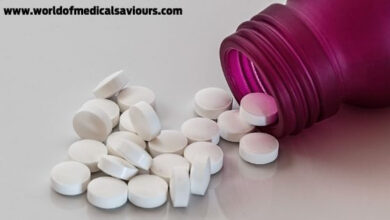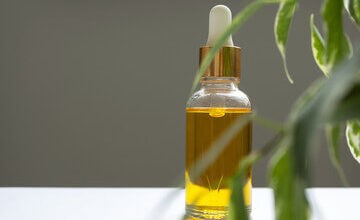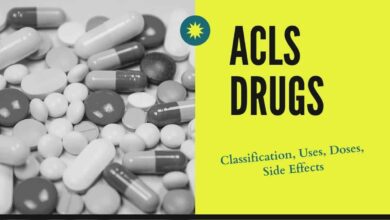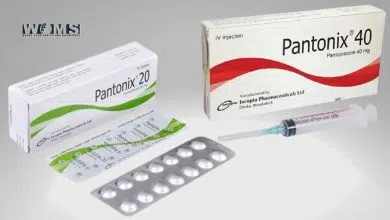Rabeprazole Sodium
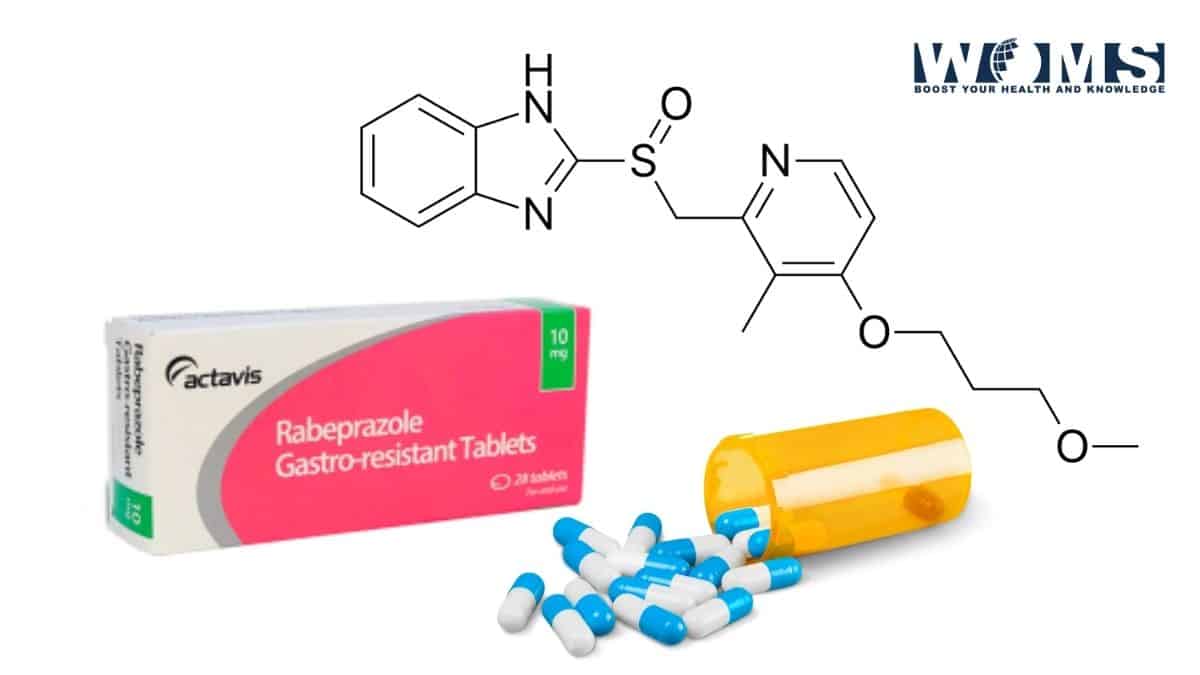
Rabeprazole sodium belongs to the class of drugs called proton pump inhibitors. It reduces the production of stomach acid and protects against acidity and gastric ulcers. Rabeprazole helps relieve symptoms such as heartburn, acidic breath, and difficulty swallowing. It helps prevent damage to the gastric mucosa.
Rabeprazole sodium is available both as tablet and capsule forms. The capsule form is a slow-release formulation, i.e, the medication is released slowly in your body and takes time to show full effect.
Rabeprazole sodium is available with the brand name, Aciphex. It is also available as a generic drug. A generic drug costs less than the brand-name version.
Brand name of Rabeprazole Sodium
- Aciphex
- Aciphex Sprinkle
Formulations available
- Tablet (10 mg and 20 mg)
- Capsule (slow-release)
Ingredients
Active ingredient: Rabeprazole sodium
Inactive ingredient: Mannitol, magnesium oxide, hydroxypropyl cellulose, magnesium stearate, hydroxypropyl methylcellulose phthalate, ethylcellulose, iron oxide yellow (coloring agent), titanium oxide, talc, low-substitutedhydroxypropyl cellulose, carnauba wax, diacetylatedmonoglycerides
Uses of Rabeprazole Sodium tablet
Its uses include:
1. Gastric ulcers
Gastric ulcers refer to the soreness in the stomach. The stomach mucosa erodes due to the increased acid production in the stomach. Rabeprazole sodium is used to treat all types of gastric and peptic ulcers by decreasing the production of gastric acid.
2. Duodenal ulcers
Duodenal ulcers develop in the duodenum that is the first part of the small intestine. It occurs due to erosion of the intestinal lining by the increased amount of acid.
3. Gastric Esophageal Reflux Disease (GERD)
GERD is a disease in which increased stomach acid production results in regurgitation of the stomach acid into the esophagus. This causes a burning sensation in the lower end of the esophagus and along the entire length of the esophagus in severe cases. Regurgitation occurs because the lower esophageal sphincter (LES) may be damaged or weakened. Symptoms such as a sour taste in the mouth and burping can also be present.
3. Cancer of esophagus
Too much acid in the stomach can cause acid regurgitation into the esophagus. This damages the epithelial lining of the esophagus and increases the risk of cancer.
4. Zollinger-Ellison syndrome
This is a rare condition that causes increased stomach acid production from a neuroendocrine tumor, called gastrinoma. This results in peptic ulcers.Rabeprazole sodium can help treat this condition.
5. Helicobacter Pylori Infections
It can be taken as a combination medication to treat certain infections such as H. Pylori infections. In this case, doctors prescribe rabeprazole sodium along with two antibiotics; amoxicillin and clarithromycin.
6. Erosive esophagitis
Erosive esophagitis can occur due to damage to your esophagus due to stomach acid regurgitation.Rabeprazole sodium can help prevent erosion of the esophagus.
Increased acid production in the stomach is a cause of all these conditions.
Dosage of Rabeprazole Sodium
It is best to take rabeprazole sodium before meals. If your doctor prescribes you to take it two times a day, take one tablet in the morning and one tablet in the evening.
For adults
Take 20 mg tablet once daily. The maximum duration for usage is 4 to 8 weeks.
For children (above 18 years of age)
Take 20 mg tablet once daily. The maximum duration for usage is up to 8 weeks.
In the case of Zollinger- Ellison syndrome
The dosage needs to be increased to 60 mg once daily in Zollinger-Ellison syndrome. The maximum dosage can be 100 mg once daily or 60 mg twice daily.
- Aciphex Sprinkle can be given to children under 12 years of age. It is a safe formulation developed for safe use in children.
Distribution in Plasma
Rabeprazole sodium is 97% bound to plasma proteins.
Shelf life
The shelf life of rabeprazole sodium is two years.
Half-life
The half-life of rabeprazole is 1 hour, i.e., 50% of the drug is eliminated from the body in one hour.
Bioavailability
The bioavailability of rabeprazole sodium is 52%. This means that this percentage of the administered drug reaches the systemic circulation or bloodstream.
How does Rabeprazole sodium work?
Rabeprazole sodium is an anti-secretory medication. It first gets absorbed by the parietal cells present in the mucosal lining of the stomach. Chemical reactions in the parietal cells activate the drug. It works by decreasing the production of stomach acid. It inhibits the hydrogen-potassium ATPase pump in the stomach lining, thereby decreasing hydrogen ions release into the stomach lumen. As a result, the production of stomach acid is decreased.
Directions to use Rabeprazole sodium
Read the leaflet thoroughly that comes with the medication before you start taking rabeprazole sodium tablets. In case of any queries, consult your doctor or pharmacist.
Rabeprazole sodium tablets
Take the tabletwith or without food or as prescribed by your physician. Consume it 1 to 2 times a day. Swallow the tablet as a whole and do not crush, chew or break it. Crushing, chewing, or breaking the tablet can release the contents at once. As a result, the risk of side effects increases.
Rabeprazole sodium capsules
If you are using rabeprazole sodium capsules, take them 30 minutes before your main meal of the day or as directed by your physician. Break open the capsule and sprinkle on your food or any liquid preparation. You can also use the medication with apple juice or infant formula (when using in children). Maintain the temperature of your food or liquid preparation at or below room temperature. Consume it as soon as possible, within 15 minutes. Do not swallow the capsule as a whole.
Take it regularly at a fixed time to help you remember so that you do not miss a dose.
Side effects of Rabeprazole sodium
Common side effects include:
- Headache
- Stomach disturbances
- Nausea and vomiting
- Gas
- Diarrhea (It can be caused by Clostridium difficile infection. Inform your doctor if you notice blood in stool or mucus in stool.)
- Constipation
- Problems in digestion
- Electrolyte disturbances such as magnesium deficiency (signs of magnesium deficiency include tremors, irregular heartbeat, and muscle aches)
- A lupus-like syndrome (symptoms include a rash on the face or cheeks and joint pain)
Some rare side effects of this medication include:
- Vitamin B12 deficiency (Symptoms include muscle weakness, numbness, tingling in hands and feet, and sore tongue. Rabeprazole sodium decreases the absorption of vitamin B12 in the gastrointestinal tract. If you have been taking rabeprazole sodium for a long period, consult your doctor whether you should start vitamin B12 supplements along with the medication.)
- Allergic reaction to the product (characterized by swelling, redness, and rash)
- Difficulty in breathing
- Severe dizziness
- Nervousness
- Insomnia
- Dry mouth
- Weight gain
- Kidney problems (symptoms include pain in urination, fever, swollen feet, and lower back pain)
- Superinfection of Clostridium difficile bacteria
- Rabeprazole sodium can increase the risk of bone weakness and bone fractures if taken for an extended period (can result in an increased incidence of fractures of the wrist, hip, or spine)
- Hepatitis
- Encephalopathy (brain swelling)
- Acute interstitial nephritis
- Dark-colored urine
- Stevens- Johnsons syndrome
Milder side effects go away in a few days to a couple of weeks. If the side effects do not go away or become more severe after rabeprazole sodium use, inform your doctor as soon as possible. Patients on long-term treatment should be kept under strict supervision to check for vitamin B12, vitamin D, and calcium values in the blood.
How to manage side effects of Rabeprazole Sodium:
Headache
Ensure plenty intake of water and take proper rest. Consult your physician to prescribe you a painkiller if the headache is severe. Your headache should go away within a week of taking rabeprazole. If it persists, contact your doctor.
Nausea
Drink plenty of water to avoid dehydration. Do not take an antiemetic without consulting your doctor. Avoid eating spicy food.
Diarrhea
Drink plenty of water to avoid dehydration. Signs of dehydration include strong-smelling urine or decreased amount of urine. Do not take anti-diarrheal medications without consulting your doctor.
Abdominal Pain
Avoid consuming those foods that cause gas such as beans or lentils. Eat small meals; eat more frequently rather than consuming bigger meals. Simethicone, available at the pharmacy, can help as well.
Constipation
In case you develop constipation, increase the amount of fiber in your diet. Consume more fresh vegetables, fruits, and cereals. Ensure plenty intake of water and exercise regularly. If symptoms do not improve, check with your doctor.
Weight gain
If you experience weight gain while taking rabeprazole sodium, consult your doctor. Do not maintain a sedentary lifestyle and exercise regularly. However, do not skip meals to lose weight.
Precautions
- If you use rabeprazole sodium for an extended period, get your vitamin B12 levels checked in the laboratory regularly.
- Keep it away from the reach of children and pets.
- Dispose of the medicine properly and do not flush it down the toilet.
- Do not use it after the expiry date.
- It is not safe to use rabeprazole sodium tablets in patients under 12 years of age and rabeprazole sodium capsules in children younger than one year.
- Do not consume more than the recommended dose.
- Consume plenty of water while taking the medication.
- Avoid using the medication if the packaging is torn or the seal is broken.
- Do not use rabeprazole sodium to treat any other condition other than that advised by the doctor. If you have any queries, discuss them with your physician.
- If you take the medication out of its original packing or container, it cannot be stored properly. So keep it in its original container for proper storage.
- Do not keep it in moist conditions such as in the washroom or at the sink. Moisture can destroy the medication.
Contraindications for use of rabeprazole sodium
Inform your doctor or pharmacist if you suffer from the following conditions:
Liver disease
If you are a patient of liver disease or hepatitis, your liver wouldn’t be healthy enough to clear the drug from your body. As a result, rabeprazole sodium levels increase in the body which can be harmful. It can also increase the severity of side effects. If you suffer from liver disease, consult your doctor before starting this medication.
Lupus
Lupus is an autoimmune disorder. Rabeprazole can worsen the symptoms of lupus. It can also cause new symptoms to occur. That is why rabeprazole is contraindicated in this condition.
Allergic reaction to the medication
Do not use the medication again if you are a known allergic to the drug. Taking the medication again can be life-threatening.
Allergic reactions to similar drugs such as lansoprazole or omeprazole
If you are allergic to proton pump inhibitors (PPIs), do not use this medication. Consult your doctor before using. Your doctor can prescribe you an alternative to this medication such as Gaviscon.
Calcium or Vitamin D deficiency
If you are suffering from calcium or vitamin D deficiency, do not use rabeprazole sodium. Consult your physician before starting the medication.
If you are pregnant or planning a pregnancy
This medication can only be used when necessary. Although there is a limited study available regarding the harmful effects of rabeprazole on humans, it is unsafe to use in pregnancy. Always consult your doctor before starting with the medication during pregnancy.
Lactating mothers
No evidence is recorded whether this medication passes into the breast milk but it should be used with caution. However, the proton pump inhibitor called omeprazole is relatively safe in lactating mothers.
Osteoporosis
Rabeprazole can worsen osteoporosis and bone weakness. So it is not recommended in patients with osteoporosis. Doctors advise using this medicine along with vitamin D supplements.
Children under 12 years of age
There is no medical evidence whether rabeprazole sodium is safe to use in children or not. However, it can be used safely in children above 12 years of age but for a maximum duration of 8 weeks.
If you have undergone endoscopy
Do not start using this medication if you have undergone an endoscopy recently. Inform your doctor before starting rabeprazole sodium.
Interactions of Rabeprazole Sodium with other drugs
Before using rabeprazole sodium, inform your doctor about all the prescription and non-prescription medications you are taking. Certain medications can alter the way how a drug works. Drug interactions with rabeprazole sodium can cause severe reactions or increase the risk of side effects. Do not taper the dose or stop the medications by yourself. Always consult your doctor before starting or stopping any medication.
Drugs that can interact with rabeprazole sodium and increase the risk of side effects include:
- Methotrexate (anti-cancer drug; also used to treat psoriasis and rheumatoid arthritis)
- Anti-HIV drugs (such as Atazanavir, saquinavir)
- Blood thinners (such as warfarin and heparin)
- Clopidogrel (anti-platelet drug)
- Digoxin (a cardiac drug)
- Cyclosporine (a drug used to suppress the immune response in case of organ transplant or tissue grafting)
- Rifampicin (an antibiotic used to treat tuberculosis)
Drugs that interact with rabeprazole sodium and make it less effective include:
- Azole antifungals (such as ketoconazole, posaconazole and itraconazole)
- Anti-cancer drugs (such as erlotinib, nilotinib, and dasatinib)
- Mycophenolatemofetil (a drug used to prevent organ transplant rejection)
- Iron supplements
- Antidepressants (such as fluvoxamine)
Rabeprazole sodium decreases the effect of the following drugs:
- Rilpivirine
(Rilpivirine is a non-nucleoside reverse transcriptase inhibitor. it also decreases gastric acid production, reinforcing the effect of rabeprazole. The alkaline pH of the stomach interferes with the absorption of rilpivirine as it is well absorbed in acidic conditions. So both these drugs cannot be used simultaneously.)
Interaction of Rabeprazole sodium with food
Rabeprazole sodium does not have any interactions with food. Your food will be digested in the normal way but it can delay its absorption for up to 1.7 hours.
Effects of Rabeprazole sodium on Lab reports
Rabeprazole sodium can also affect certain lab reports causing false-negative tests. Make sure to tell your doctor or laboratory technician that you use this drug.
Rabeprazole sodium can have effects on blood cell counts. For example, it can result in:
- Leucopenia (decreased white blood cells)
- Neutropenia (decreased neutrophils)
- Thrombocytopenia (decrease in the number of platelets)
When to contact the doctor
Consult your doctor if:
- the condition persists or worsens over time.
- The severity of side effects increase
- Severe and frequent vomiting
- If you experience severe, persistent diarrhea, abdominal pain, blood in stool, or fever
- Unexplained weight loss
- Chest and shoulder pain, with shortness of breath
- Seizures or tremors
- Black stools (due to passing of blood in stool)
- If you vomit blood (hematemesis)
Overdosage of Rabeprazole Sodium
Contact the doctor or poison control center if someone has overdosed on rabeprazole sodium tablets. Symptoms of overdose include:
- Irregular/ fast heartbeat
- Blurred vision
- Severe abdominal pain
- Confusion
- Drowsiness
An overdose occurs because rabeprazole sodium binds to the plasma proteins and is reversible without medical treatment. However, these symptoms are not reported in overdoses up to 80 mg.
Addiction Liability
Rabeprazole sodium is not a habit-forming drug i.e., it has no abuse potential.
However, if you are using rabeprazole sodium for a long period, consult your doctor before stopping the medication. Stopping the medication after taking it for a long period can increase acid production in the stomach and make your symptoms return.
Rabeprazole-ER
Another formulation is available called rabeprazole-ER (Rabeprazole- Extended Release). It was developed to increase the half-life of rabeprazole. It is normally too precise in humans.
Rabeprazole sodium and domperidone capsules
This is a well-tolerated, combination medication used to treat stomach acidity, ulcers, and heartburn.
Domperidone capsules increase the peristaltic movement of the stomach and intestines to move food across the gastrointestinal tract effectively and quickly. It is a prokinetic drug.
It is advised to take this combination medication one hour before a meal, preferably in the morning.
Changes in diet that can cure GERD
The diet you consume can affect the amount of acid produced in the gastrointestinal tract. The listed foods cannot cure your condition but can bring an improvement in your symptoms:
- Vegetables
- Non-citrus fruits
- Ginger
- Oatmeal
- Seafood
- Lean meat
- Healthy fats
- Egg white
You should add these foods to your diet in addition to taking rabeprazole sodium tablets so that your symptoms can be improved.
Avoid the following foods:
- Citrus foods
- Tomatoes
- High-fat foods
- Garlic and onions
- Mint
- Chocolate
Frequently asked questions
What is rabeprazole sodium?
Rabeprazole sodium is a sodium salt of the prodrug rabeprazole, a proton pump inhibitor. It has anti-ulcer activity and helps cure GERD and peptic ulcer disease.
What should be the length of treatment with rabeprazole sodium?
The length of treatment with this medication depends on your present condition and your body’s response to the treatment. Your doctor will recommend that for how long the treatment should continue. Some people need to take rabeprazole only when needed,i.e., when symptoms show. Once the patient feels better, he/she can stop taking the medication.
Can I take antacids along with rabeprazole sodium?
Yes, you can take antacids along with rabeprazole. If you take sucralfate (antacid), consume sucralfate 30 minutes before rabeprazole sodium tablets.
Can I stop taking the medication if I feel better?
Continue taking the medication for as long as your doctor has prescribed it. Do not stop the medication beforehand even if you start feeling better. Otherwise, the condition can relapse.
Can I take anti-diarrheal medications if I develop diarrhea after using rabeprazole sodium?
Do not take anti-diarrheal or opioid medications if you experience any symptoms of diarrhea or abdominal pain. These medications can make the symptoms worse.
What if I miss a dose?
If you miss a dose or forget to take one, consume it as soon as you remember. If it’s time for the next dose, skip the previous one. Never take a double dose at a time. If you forget doses often, set an alarm as a reminder.
How should I store the medication?
Remember to store rabeprazole sodium tablets in a cool and dry place. Keep it away from moisture and heat. The temperature should be between 15 to 30 degrees Celsius.
What happens if I take the medication for a longer period than prescribed?
Taking the medication for a long time can cause severe side effects such as vitamin B12 deficiency and bone fractures. It can also cause a condition called fundic gland polyps. So it is advised to take rabeprazole sodium for only a short length of time as prescribed by your doctor.
Can taking this medication for a long period cause stomach cancer?
Patients who take rabeprazole sodium for an extended period (for almost 3 years or more) can have a chance of developing stomach cancer. However, the chances are very low. Medications like rabeprazole sodium can result in side effects so these medications should be taken for a short period.
Is there any alternative to this medication?
Alternatives to rabeprazole sodium are available at the pharmacy. Discuss with your doctor if this medication does not suit you or if you develop any severe symptoms. Your doctor can prescribe you an alternative to this medicine. Alternatives can include omeprazole, esomeprazole, pantoprazole or lansoprazole.
Is it safe to use rabeprazole and domperidone combination?
Yes, it is safe to use this combination medication. It is safe for most people but can result in mild to severe side effects in other people. Side effects include diarrhea, headache, abdominal pain, and lightheadedness. Inform your physician if you experience any of these symptoms.
What are the contraindications of rabeprazole and domperidone capsules?
Contraindications of this combination medication include allergic reactions to either rabeprazole or domperidone. Allergic reactions can also be caused by any other inactive ingredients in the medication. People with liver or kidney disease are also advised to use the medication cautiously.
Can I get a refillable prescription for this medication?
Yes, the prescription for rabeprazole sodium is refillable. You would not need a new prescription for this medication every time. Your doctor will write the entire course of medication or the number of refillable on your prescription.
Can I carry this medication with me while travelling?
Yes, you can carry rabeprazole sodium tablets with you while travelling but do not put them in your check-in baggage. You can keep it in your hand-carry. Always carry the doctor’s prescription with you so that you can show the airport staff when asked for it.
Which other PPIs can be used for GERD?
Omeprazole (Prilosec) and esomeprazole (Nexium) are other PPIs that can be used for GERD. Omeprazole and esomeprazole are similar drugs and there is only a minor difference between their chemical structure.
Will the dose of rabeprazole sodium be increased or decreased?
Your doctor may increase your dose of rabeprazole if he/she feels that your symptoms aren’t improving. Depending on your condition, your doctor may recommend you to take a higher dose for a month or so. After this, you may need to take a lower dose.
Which proton pump inhibitor (PPI) is safe to use in pregnancy?
Omeprazole is the safest PPI to use in pregnancy. However, it is advisable to treat the symptoms of heartburn with diet control and other remedies during pregnancy. Eat smaller meals and eat more frequently. Drink lots of water. If the symptoms do not improve, consult your doctor to prescribe you omeprazole to help you.
When will my symptoms start to improve?
Your symptoms may start to improve in 2 to 3 days of taking rabeprazole sodium. But in some patients, it may take longer to improve the symptoms of heartburn or peptic ulcer.
Can I take painkillers for abdominal pain along with rabeprazole sodium?
Yes, it is safe to take painkillers with rabeprazole sodium for abdominal pain or other types of pain. Painkillers such as paracetamol and ibuprofen can be used.
Can I drink alcohol while taking rabeprazole sodium?
No, it is not safe to drink alcohol while taking rabeprazole sodium. Alcohol intake can increase the production of acid in the stomach. This can irritate the stomach mucosa and make the symptoms worse.
